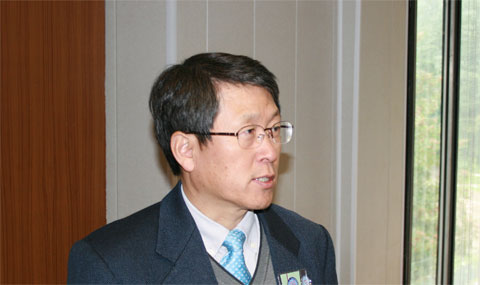

Professor Il Soon Hwang, director of Nuclear Transmutation Energy Research Center of Korea (NUTRECK), head of SNU (Seoul National University) Nuclear Materials Laboratory.
We have very strong nuclear power to support as much as 35.3% of electricity generation in Republic of Korea. The earliest one we are starting is now 31 year old. We have accumulated a lot of spent nuclear fuel.
By now, we have some 10,000 metric tones of spent fuel. We expect that all available space in the nuclear power plant to store additional spent fuel will be completely exhausted by 2016. So, the further operation of the nuclear power plants is depending on how we can find the solution to handle spent nuclear fuel.
The earliest Korean pressurized water reactor (PWR) has been connected to the grid at June 26, 1977 - "Kori-1" unit in Busan.
Used fuel in Republic of Korea is stored on the reactor sites pending construction of centralized interim storage facility by 2016 (as expected). The further way of the spent fuel handling is still under discussion.
Our Korean public is very nervous about disposing of high-level wastes. So, we have very difficult situation with the spent fuel storage. However, the idea to construct the low-level waste storage facility is already accepted by public. I underscore that our communities have the very clear position - they see no problem in accepting the low-level waste but they are adamantly refusing to accept the high-level waste including the spent nuclear fuel.
In order to accept this kind of situation in Korea, our university is pursuing the technical solutions to transmute the spent nuclear fuel. We expect that we can eliminate the long-living radioactive isotopes. Eventually we hope to turn all the spent nuclear fuel into low or medium level nuclear waste.
That means we can continue our nuclear power program with the public acceptance. One can say that the transmutation technology could help us to win this public acceptance. This technology is not only environmental friendly but also safe and proliferation resistant.
We see that the heavy metal coolant technology has the great advantages over any other existing technological option for the transmutation applications because of its chemical inertness, high boiling point and good capability for natural circulation.
Therefore, we are going to take the advantage of this Russian innovation in nuclear coolant to develop the safe and proliferation-resistant transmutation technology.
Thank you for the interview for AtomInfo.Ru web-edition, which was given during the HLMC-2008 conference in Obninsk, Russia.
SOURCE: AtomInfo.Ru
DATE: September 23, 2008
Topics: Lead-Bismuth, Russia, South Korea, Spent Fuel